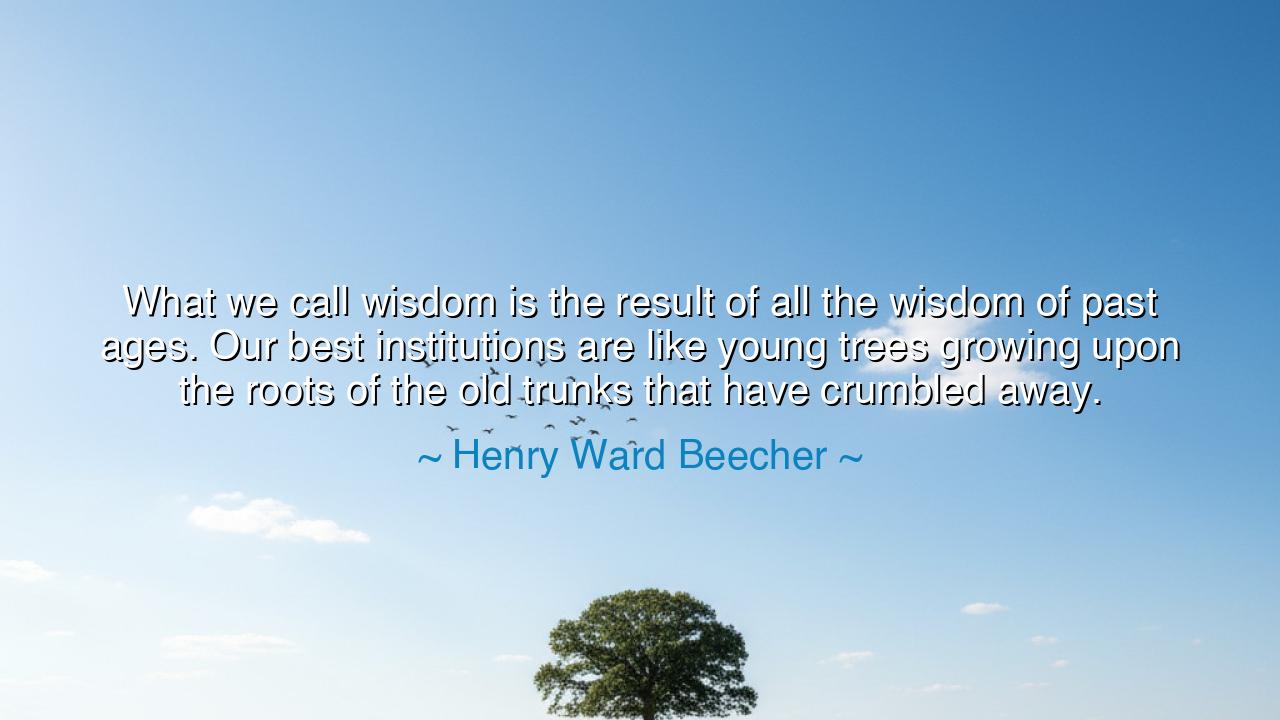
What we call wisdom is the result of all the wisdom of past
What we call wisdom is the result of all the wisdom of past ages. Our best institutions are like young trees growing upon the roots of the old trunks that have crumbled away.






Hearken, O children of reflection, to the profound insight of Henry Ward Beecher, who speaks of the nature of wisdom and the legacy of human endeavor. He declares that what we call wisdom is not born anew in each generation, but emerges as the harvest of all the wisdom of past ages. Herein lies a teaching for the ages: the understanding we cherish is rooted in the labors, triumphs, and lessons of those who came before, and it is through this inheritance that human civilization endures and grows.
The origin of this reflection is rooted in Beecher’s life as a clergyman, reformer, and observer of society in nineteenth-century America. In his writings and sermons, he often emphasized the continuity of moral and social knowledge, noting that human institutions and principles do not arise spontaneously, but are cultivated upon the foundations of prior experience. The analogy of young trees growing upon the roots of old trunks evokes the delicate balance of innovation built upon the remnants of the past, honoring the fallen while nurturing the new.
The meaning of this aphorism is profound: every society, law, and principle that we regard as noble or just owes its strength to the wisdom preserved across generations. Human institutions, like young trees, are sustained by roots that extend into history, drawing nourishment from the trials, errors, and triumphs of ancestors. To disregard this continuity is to risk weakness and fragility, for even the most flourishing structures depend upon the hidden wisdom embedded in the past.
History provides living testimony to this teaching. Consider the United States Constitution, a document that emerged from the efforts of many minds over time. The framers drew upon centuries of legal, philosophical, and political wisdom—from Magna Carta to Enlightenment thought—to craft an institution that endures. Here, Beecher’s vision is made manifest: the best institutions are rooted in the lessons of old trunks, strengthened by reflection on the triumphs and failures of prior ages.
Moreover, this teaching extends beyond governance to every endeavor of human life. Art, science, education, and morality all rely upon the accumulation of wisdom through time. The apprentice learns from the master, the scholar studies ancient texts, and the innovator stands upon the discoveries of predecessors. Beecher reminds us that growth without acknowledgment of the past is brittle, and that the vitality of the present rests upon the careful cultivation of history’s enduring truths.
O generations yet unborn, take this counsel into your hearts: honor the wisdom of past ages, nurture the roots laid by those who came before, and build institutions, knowledge, and virtue upon their enduring foundations. For in this continuity, the young trees of today will grow strong, the lessons of history will illuminate your path, and the eternal light of human understanding and justice will shine across the ages.






AAdministratorAdministrator
Welcome, honored guests. Please leave a comment, we will respond soon